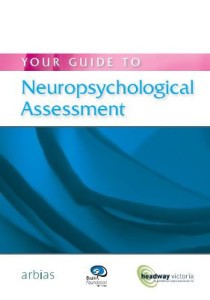 A neuropsychological assessment after brain injury is often recommended.
A neuropsychological assessment after brain injury is often recommended.
In my experience this can be a source of worry to people living with brain injury and their families. Concerns include how this will be done and what the benefit will be.
A support worker recently asked me how they could support a person who was about to have a neuropsychological assessment after brain injury. This lead me to try and answer some common questions here.
This article will briefly look at:
[unordered_list style=”tick”]
- Why Neuropsychological assessment might be done.
- Steps that might be taken to prepare for the assessment.
- What is likely to happen in the assessment.
- What is assessed.
- What a person living with brain injury, and their family might get from the assessment.
[/unordered_list]
Why Undertake A Neuropsychological Assessment After Brain Injury?
To provide information to people involved;
For the person with the injury, their family and supporters such as where damage might have occurred and its impact on the way the brain works.
To the treating team which can assist developing strategies and supporting life plans.
Assist Accurate Diagnosis
When there are questions about diagnosis, (e.g. when diagnosis has been missed).
Understand why changes have occurred (e.g. changes with the progress of neurological disease).
Explain the outcomes such as cognitive and behavioural changes, and the likely impact on life.
IAssist Develop Focussed Strategies
Work out strategies to best support the person.
Assist in the design of life planning, treatment plans and goal setting.
When evaluating the effectiveness of a strategy, or program.
Life Planning
To give more information about what skills a person has. Such as being able to live alone, return to school or study, drive a car, manage their finances.
To establish what support a person might need e.g. living alone, returning to school.
Preparing for a significant change such as leaving hospital, or changing accommodation.
To establish the existence of, or extent of, disability when seeking compensation.
Preparing for a Neuropsychological Assessment
Whether you are a person living with brain injury or a supporter; if a Neuropsychological Assessment is recommended there are some things you can do to help prepare.
Firstly remember this is not an exam or test it is too help you live as well as possible.
You do not need to study for this assessment.
There are things you can do to prepare so that you can make sure it is a good measure of what you can do:
[unordered_list style=”tick”]
- Before the assessment write down any questions that you may wish to ask on the day.
- If you have times of the day that are better (morning/afternoon) make your appointment during those times.
- If fatigue is an issue during the assessment, ask for small breaks.
- Have someone you feel comfortable with accompany you to the assessment.
- Get there a little early. If catching public transport make sure you allow sufficient time to arrive at the appointment on time.
- If you wear reading glasses take them to the assessment.
- Some medications, drugs and alcohol affect your ability to do your best in the assessment:
ensure you are free from the effects from alcohol and drugs.take a list of any prescribed medication with you.[/unordered_list]
Please share any other tips in the Comments below.
What Happens in a Neuropsychological Assessment:
Neuropsychological assessment after brain injury usually involves an interview and a number of tests. These look at a range of things such as memory, problem-solving skills, intellegience, attention and concentration.
The assessment is most often conducted by a Neuro-psychologist. A psychologist with special knowledge and expertise in brain-behaviour relationship.
A specific set of tests is selected according to what you want from the assessment and the areas of the brain that are most likely to be affected.
How Long Will Tests Take?
Generally the test will take a few hours.The time may vary because:
[unordered_list style=”green-dot”]
- the structure of the assessment to make sure specific questions are answered
- extra tests to gather detailed information may be necessary
- tests to check specific life skills and abilities maybe needed such as assessing ability to manage financial affairs or a return to work
[/unordered_list]
More time may be needed because of difficulties e.g.concentration, medication, fatigue.
The assessment might need to be spread over a few sessions e.g. if fatigue becomes an issue.
What Does the Neuropsychologist From You for the the Best Possible Outcome:
Most important is that the Neuro-psychologist has the information to ensure a thorough understanding of the person having the assessment:
Contact with people who know you well such as Doctors, Case managers, family and friends.
To build up a picture of strengths, abilities and personal qualities and whether these have changed over time information needed might include:
[unordered_list style=”tick”]
- Specific details about any current problems: how long the problem(s) have been present, how it affects day-to-day life
- Past medical information, including any psychiatric or drug and alcohol history, previous head injuries, hospitalizations and current medication.
- Educational, work and social history such as level of schooling completed, work history and hobbies.
[/unordered_list]
It is not a medical check-up and does not usually involve any physical examinations.
What Might Be Looked At In A Neuropsychological Assessment After Brain Injury?
Some of the things that the might be assessed are:
[unordered_list style=”green-dot”]
- Orientation: Awareness of self, time and place.
- Attention: Whether the person can sustain their attention, divide attention between two tasks and how much the person can process at once.
- New learning ability (both verbal and visual).
- Speed of information processing: How quickly a person can perform a range of tasks.
- Intellectual functioning: This may assess a wide range of abilities.
- Memory: Long term and Short term memory
- Executive abilities: These range of tests might measure; the ability of the person to solve problems and maintain focus on a task., a person’s ability to control their behaviour, their motivation and initiative, being able to think beyond their own needs, to fully understand their difficulties.
- Language: Reading, writing, auditory comprehension, the ability to follow instructions, naming, and conversation. For example reading something and then explaining it to someone else.
- Spatial ability for instance the ability to complete tasks requiring hand-eye coordination, the ability to recognise or reproduce patterns, to put objects together.
- Changes with time if previous information is available.
[/unordered_list]
What A Neuropsychological Assessment After Brain Injury Should Tell You:
Generally after the session the neuropsychologist prepares a written report and will talk you through the results and what they mean.
This report will likely include:
[unordered_list style=”green-dot”]
- Information about performance on the tests.
- Comparison to what would generally be expected of a person of similar age and educational background.
- Comparison of results to any previous assessments you have had.
- Suggested answers to the reason for the assessment was requested.
- Suggested strategies to work around the difficulties identified.
- Strategies, aids, or assistance that might be required, including approaches for family and supporters.
[/unordered_list]

Click on the image of the book cover to the left if you would like a copy of ‘Your Guide to Neuropsychological Assessment’. A booklet produced in 2008 as part of an Acquired Brain Injury Information Project in Australia.
And Finally
A person having a Neuropsychological assessment should be able to expect it will be done sensitively, in a way that is respectful of the person with brain injury.
In a way that is responsive to your specific needs and provides you will useful information.
The Neuropsychological assessment is a way of finding out if there are particular effects that result from your brain injury. It can provide some useful information to help build on strengths and work around areas that have been damaged.

This is very informative and thorough. My experience with the examiner corroborates what you say: he was very patient and kind. I’ll just add a couple of comments:
I’ve talked to a number of people about my exam and some people wonder why a neuropsychological assessment (NPA) is used instead of a brain scan. The answer is that brain scans are not nearly as sensitive to cognitive function/dysfunction. Scans may pick up large areas of damage, but they cannot pick up diffuse damage that occurs at the cellular level. NPAs have been developed over many decades and they’re incredibly accurate. They’re very fascinating.
The test was very useful for me for a couple of reasons: my injury was not traumatic. It occurred slowly over a long period of time, so there wasn’t really an awareness that it was even there aside from the fact that my cognitive abilities were in sharp decline. I was amazed at how accurately it described me; in some ways it knew me better than I knew myself, because I hadn’t perceived some of my short-comings in the context of a brain injury. It was very validating for me: my ex was very dismissive of my problems. Finally I had it in black and white. It also set me on a path to discovery: I may not be able to fix my problems, but now that I know they are there and what area of the brain is the problem, I can research and adapt.
Taking the test did wind up being stressful for me. It was sort of the culmination of many years of suffering being put to the test and I had no idea how it would turn out. But again, my examiner was very compassionate, patient, and understanding. And in the end, the test was SO worth it.
Thank you so much for your insights. I hope your comments will be read as an addition to the information in the article as they give valuable insights about Neuropsychological Assessment and what to expect. Melanie